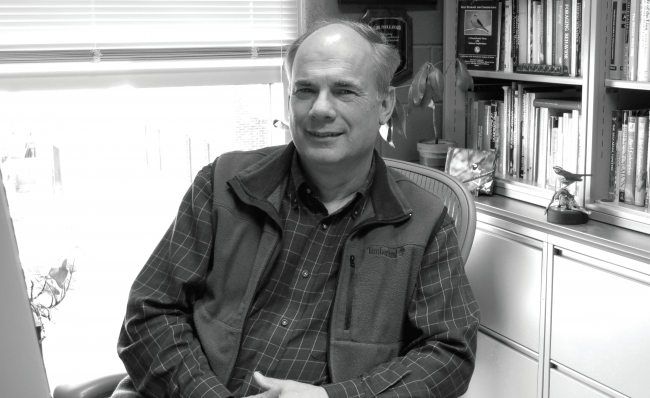

Photo Credit / Rebecca Jasulevicz
By Zachary Gotthardt
SC Staff Writer
If you ever are fortunate enough to spot an osprey in Pennsylvania, head over to the Science and Technology Center and thank Dr. Terry Master of the Biology Department.
Dr. Master is a professor of biology and serves as the Departmental Graduate Program Director in the Biology Department.
He started his academic career at Muhlenburg College, studying biology from 1972 to 1976.
Following a year of undergraduate research, he attended Southern Illinois University to study Wildlife Management as a graduate student.
The following year he transferred to ESU to complete the program in 1980, studying under Dr. Larry Rymon.
According to Master, Rymon is “very well-known for having reintroduced Ospreys into the Poconos and…Pennsylvania.” Dr. Master contributed to the project, caring for the introduced Ospreys, which came from Virginia and were housed in man-made structures around the Poconos.
For his Master’s Thesis and part of the project, Master examined “bird density and species diversity along an elevational gradient from Pocono Island in the Delaware River to the top of Kittatinny Ridge.”
Afterwards, Dr. Master worked as a wildlife consultant and eventually a zookeeper at the Philadelphia Zoo.
He returned to academics as an adjunct professor at Northampton Community College before attending Lehigh University for a Doctoral Degree in 1984. He completed the program in 1989 and became a professor at ESU later that same year.
According to Master, for his PhD he researched “foraging behavior of snowy egrets in predator-prey relationships” in Stone Harbor, New Jersey. Based on his past research, his apparent tendency to mention birds in his classes is no surprise.
Dr. Master teaches many of the ecology-based classes, such as General Ecology, Behavioral Ecology, Animal Behavior, and Biology of Tropical Ecosystems.
As the resident ornithologist on staff, Dr. Master claims, “My students accuse me of teaching an ornithology class no matter what the official title of the class is.”
Although Dr. Master believes these claims to be exaggerated, sure enough, he teaches Ornithology each spring.
Master is focusing his recent research on two areas.
The first area is collaborative work on herons and egrets with, according to Master, “the state’s largest heronry on Wade Island in the Susquehanna River in Pittsburg.”
His second area of research focuses on songbirds that prefer riparian habitats, and in particular, species associated with Hemlocks. The focus of the research is “the ecology and behavior and their use as a bioindicator of habitat health.”
He continued, “Hemlocks are being decimated by the hemlock adelgid invasion.” The hemlock adelgid is an invasive insect that is driving our state tree to extinction.
Since he became a professor 25 years ago, Dr. Master has worked with nearly 30 graduate students.
One of his three current graduate students, Megan Napoli, is studying Acadian Flycatcher productivity and behavior in Hemlock ravines and streams.
Along with a recent graduate, Katie Barnes, they are also part of a larger scale project.
The project seeks to discover where Louisiana Water Thrushes spend winters by using Geolocators. These devices are attached to the birds and measure daylight length to approximate latitude and longitude. By extension, location can be analyzed.
Dr. Master anticipates the result of this study, stating, “It will be exciting in the spring to see who — and how many — come back and to see where they went.”
Megan Napoli is set to graduate in the spring.
As a professor, Dr. Master enjoys interacting with his students. In particular, he enjoys working with his graduate students and “watching them develop into researchers and watching them develop their expertise.”
He continued, “Plus, we get to go to some pretty cool places and habitats along the way,” referencing the annual trip to Costa Rica with the Biology of Tropical Ecosystems class.
In the past, Dr. Master has also taken a class to the Galapagos Islands, as well as seven trips to East Africa.
Some of his former graduate students have also gone on to become professors. Dr. Greg George researches water thrushes and cerulean warblers as a professor at Delaware Valley College.
Dr. John Leiser is a professor at Northampton Community College. In all, about a third of Dr. Master’s graduate students have continued on to doctoral programs.
Dr. Master hopes to continue his current research. He has been a part of many projects in the Delaware Water Gap and he “would like to assemble those [projects] into a single document.”
He was also an integral part of the development of the Schisler Museum of Wildlife and Natural History.
Now that the museum is officially open, Dr. Master claims, “It was great to see [the museum] finally after 12 years of work… The whole project has a 25-year history, before I was even here.”
If you are interested in ecology or ornithology, take a class with Dr. Master. Hundreds of students have already been a part of his legacy, and you can too.
Email Zachary at:
zgotthar@live.esu.edu
